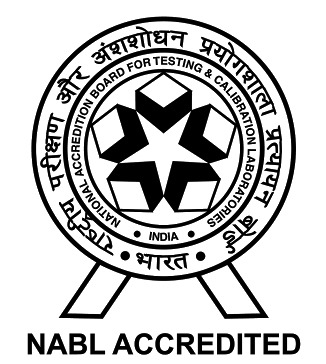About NABL
What is NABL?
The National Accreditation Board for Testing and Calibration Laboratories (NABL) is an autonomous body under the guidance of the Dept. Of Science & Technology, Govt. of India whose purpose is to provide accreditation to testing and calibration of clinical laboratories in the country.
It is the sole accreditation body authorized by the Govt. of India that provides a third-party assessment of quality and technical competence of labs. NABL also shares links with Asia Pacific Laboratory Accreditation Cooperation and International Laboratory Accreditation Cooperation.
So, why does NABL accreditation matter to the numerous medical labs, testing centres and other healthcare providersin India?
NABL accreditation is recognized and valid through all the major economies of the world, and by all regulators in India.
- Superior competence in the process of calibration
- Potential increase in business due to customer confidence and satisfaction
- Recognition and greater reach of products in domestic & international markets
- Saving of time and money from reduced retesting of products
- Better control of laboratory operations and feedback
- Assurance of genuine reports from accurately calibrated testing
- Confidence in personnel performing tests
- Elimination of the need for re-testing thereby saving money & time
- Satisfaction from the services provided

And in this way, NABL establishes trust and quality for labs where competence is concerned. The next time you book an appointment at a medical lab, take a moment to find out if they are NABL certified. Better yet, book your online appointment at Quality Health taking advantage of its convenient interface.
Quality Health is a platform that connects you with NABH & NABL hospitals and testing centres. Book your appointments online with ease at the best hospitals and healthcare centres in your city.
IMPORTANCE OF NABL
The National Accreditation Board for Testing and Calibration Laboratories (NABL) is an autonomous body under the Ministry of Science and Technology, Government of India. It provides accreditation to testing and calibration laboratories in various fields. The accreditation process involves a rigorous evaluation of the laboratory’s competence, adherence to international standards and quality management system.
NABL accreditation is important because it ensures that the laboratory is capable of providing accurate and reliable testing and calibration services. It signifies that the laboratory meets internationally accepted standards and practices, thus increasing customer confidence and facilitating acceptance of test results globally. NABL accreditation also helps laboratories comply with regulatory requirements and promotes continuous improvement through regular assessments and surveillance.
Importance of NABL Accreditation
The guidelines for NABL accreditation process include the following steps:
The laboratory submits an application for accreditation to NABL.
NABL reviews the laboratory’s quality manual, procedures, and other relevant documents to ensure compliance with international standards.
NABL conducts a pre-assessment visit to evaluate the laboratory’s readiness for the accreditation process. This helps the laboratory identify any gaps or areas of improvement.
NABL performs an on-site assessment of the laboratory by a team of experts. This includes the evaluation of facilities, equipment, personnel, and testing/calibration procedures.
The assessment team prepares a report based on their findings and submits it to NABL for evaluation.
If any non-compliance or non-conformities are identified, the laboratory must take corrective actions to address them.
A final assessment is conducted after the corrective actions have been implemented. If all requirements are met, NABL grants accreditation to the laboratory.
A surveillance audit will be carried out each year to take suitable corrective actions followed by renewal to continually check the laboratory’s competence and adherence to international standards.

The guidelines for NABL accreditation process include the following steps:
Quality assurance:
NABL accreditation signifies that a laboratory meets international quality standards and is competent to provide accurate and reliable test results. It assures customers that the laboratory’s testing and calibration services are of the highest quality.
International recognition:
NABL is a signatory to the International Laboratory Accreditation Cooperation (ILAC) and Asia Pacific Laboratory Accreditation Cooperation (APLAC) Mutual Recognition Arrangements. This means that NABL-accredited laboratories are recognized internationally, facilitating acceptance of test results across borders.
Competency assessment:
Through the accreditation process, laboratories undergo a thorough evaluation of their technical competence, including personnel, equipment, procedures, and quality management system. This helps identify areas for improvement and ensures continuous development and enhancement of skills.
Compliance with regulatory requirements:
Many industries and regulatory bodies require laboratories to hold NABL accreditation for certain types of testing and calibration. Accreditation helps laboratories comply with these requirements and enables them to participate in tenders and contracts where accreditation is a prerequisite.
Customer confidence:
NABL accreditation builds trust and confidence in the laboratory’s services among its customers. It demonstrates the laboratory’s commitment to quality, accuracy, and reliability, leading to increased customer satisfaction and loyalty.
Continuous improvement:
NABL accreditation follows a cycle of continual improvement. Once accredited, laboratories are subject to regular surveillance assessments to ensure ongoing compliance with standards. This encourages laboratories to continuously improve their processes, systems, and services, leading to enhanced quality and customer satisfaction.
Potential increase in business:
Due to enhanced customer confidence and satisfaction, accredited laboratories receive a form of international recognition, which allows their data and results to be more readily accepted in overseas markets. Accreditation helps to reduce costs for manufacturers and exporters who have their products or materials tested in accredited laboratories, by reducing or eliminating the need for retesting in another country.
Improvement in performance via Proficiency Tests:
Many laboratories operate in isolation from other laboratories and do not have ongoing opportunities to compare their data with others. Without such opportunities, there are risks that the data of a laboratory may have errors, biases or significant differences when compared to data from other similar laboratories. Proficiency testing provides an opportunity to undertake such comparisons and to have an independent appraisal of the laboratory’s data compared to reference values (or other performance criteria) or to the performance of similar laboratories. The results from such participation provide laboratory managers with either a confirmation that the laboratory’s performance is satisfactory or an alert that an investigation of potential problems within the laboratory is required.
Overall, NABL accreditation is important as it provides a framework for evaluating and ensuring the quality and competence of testing and calibration laboratories. It benefits both the laboratories and their customers by promoting confidence, reliability and international recognition.
Accreditation Procedure

